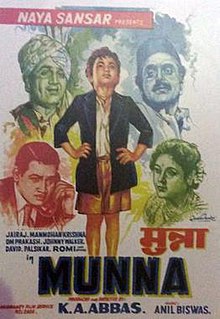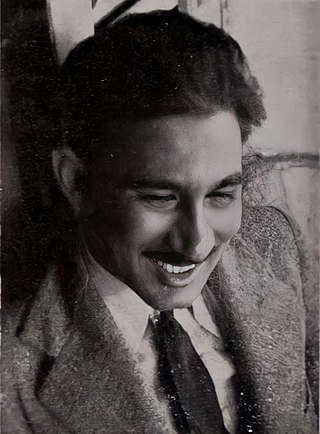
Khwaja Ahmad Abbas was an Indian film director, screenwriter, novelist, and journalist in Urdu, Hindi and English. He won four National Film Awards in India. Internationally, his films won the Palme d'Or at Cannes Film Festival and the Crystal Globe at Karlovy Vary International Film Festival. As a director and screenwriter, he is considered one of the pioneers of Indian parallel or neo-realistic cinema.
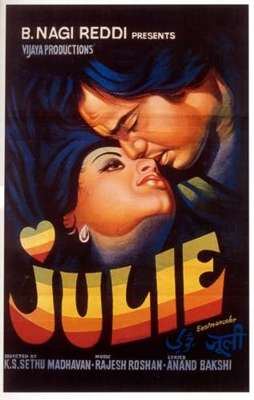
Julie is a 1975 Indian romantic drama film directed by K. S. Sethumadhavan and written by Chakrapani. The film stars Lakshmi in the title role. It also stars Vikram Makandar, Nadira, Rita Bhaduri, Om Prakash, Utpal Dutt and Sridevi, in her first significant Hindi role. The film was a critical and commercial success. Despite the film's success, Lakshmi felt comfortable in choosing to do mostly South Indian movies. Julie was also a musical blockbuster with critics alike and with award-winning music by Rajesh Roshan, which won him the Filmfare Award for the year. It had one of the first English songs in an Indian film, "My Heart is Beating", sung by Preeti Sagar. It is a remake of a Malayalam blockbuster film Chattakari (1974), which also starred Lakshmi as the female lead making her Malayalam and Hindi film debuts in both versions respectively. She would star in yet another remake, the Telugu film Miss Julie Prema Katha (1975). She didn't act in the Kannada remake, Julie, released in 2006, which had Ramya in the title role as Julie and Dino Morea as the leading man. She also declined the role of Julie's mother in the Malayalam remake titled Chattakari (2012), stating that she wanted the audiences to remember her as the young and beautiful Julie; the title role went to Shamna Kasim. Actress Urvashi portrayed the role of Julie in its Tamil remake Oh Maane Maane (1984). The remake and adaptation rights of this film are now owned by Glamour Eyes Films.
Sombhu Mitra was an Indian film and stage actor, director, playwright, reciter and an Indian theatre personality, known especially for his involvement in Bengali theatre, where he is considered a pioneer. He remained associated with the Indian People's Theatre Association (IPTA) for a few years before founding the Bohurupee theatre group in Kolkata in 1948. He is most noted for films like Dharti Ke Lal (1946), Jagte Raho (1956), and his production of Rakta Karabi based on Rabindranath Tagore's play in 1954 and Chand Baniker Pala, his most noted play as a playwright.
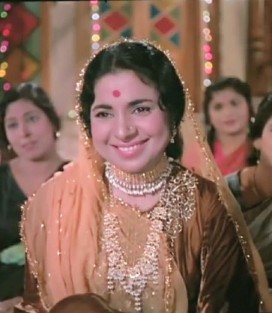
Achala Sachdev was an Indian actress who appeared in classic films of Hindi language film industry, who started her career as a child actor. She later became known for mother and grandmother roles in Hindi films. Her most memorable roles were as Balraj Sahni's wife in Waqt (1965) and Kajol's grandmother in Dilwale Dulhania Le Jayenge (1995).
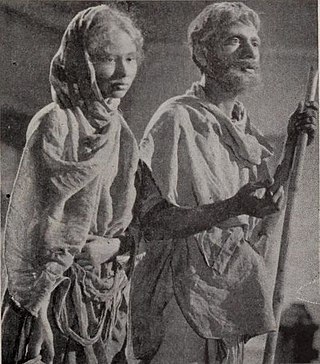
Dharti Ke Lal is a 1946 Hindustani film, the first directorial venture of the noted film director Khwaja Ahmad Abbas. It was jointly written by Khwaja Ahmad Abbas and Bijon Bhattacharya, based on plays by Bhattacharya and the story Annadata by Krishan Chander. The film had music by Ravi Shankar, with lyrics by Ali Sardar Jafri, Nemichand Jain, Vamiq, and Prem Dhawan.
Tripti Mitra was a popular Indian actress of Bengali theatre and films, and wife of Sombhu Mitra, noted theatre director, with whom she co-founded pioneering theatre group Bohurupee in 1948. She has acted in films like Jukti Takko Aar Gappo and Dharti Ke Lal.

Char Dil Char Rahen is a 1959 Hindi film directed by Khwaja Ahmad Abbas, and starring two big stars of the era, real-life brothers Shammi Kapoor and Raj Kapoor. The movie is based on a novel of the same name.
Rashid Khan was an Indian character actor. He made his acting debut in the 1946 film Dharti Ke Lal and appeared in more than sixty films between 1946 and 1974. He frequently appeared with Dev Anand in films including Afsar, Anand's first production from his company Navketan Films and went on to work with him in hits like Baazi, Taxi Driver,Tere Ghar Ke Samne, Bombai Ka Babu and Kala Bazaar, in which he played key roles. They worked together till the 1973 film Banarasi Babu.

Kanyadaan is a 1968 Hindi social romantic drama film directed by Mohan Sehgal. The film was produced by Rajendra Bhatia for Kiron Productions. The story and screenplay was written by R.A Baqueri with dialogue by Sarshar Sailani and director of photography was K. H. Kapadia. The music direction was by Shankar Jaikishan and lyrics by Hasrat Jaipuri and Gopaldas Neeraj. The film stars Shashi Kapoor, Asha Parekh, Om Prakash, Achala Sachdev, Dilip Raj, Sayeeda Khan and Padma Rani.
Naukri is a 1954 Indian Hindi-language film directed by Bimal Roy for Bimal Roy Productions. The lead actors were Kishore Kumar and Sheila Ramani. This film is about the dreams and aspirations of the educated youth getting shattered as they struggle in the city for employment, in the ensuing years after India attained independence. Naukri and Baap Beti (1954) are cited as "sensitive" and "memorable" films from Roy. In Naukri, Bimal Roy tackles yet another social problem, this time involving unemployment. Naukri is one of the earliest films where Kishore Kumar first gained prominence. Since his comic persona had not yet fully developed, Naukri sees a sincere, sensitive and restrained performance from him.

Chandni Chowk is a 1954 classic Muslim social drama film directed by B. R. Chopra.

Rahi is a 1953 Hindi social drama film produced and directed by K. A. Abbas. The film was based on Mulk Raj Anand's novel "Two Leaves and a Bud" (1937), which was scripted by Abbas. It was produced as a bilingual in Hindi as Rahi and in English as The Wayfarer, under the Naya Sansar banner. Its screenplay was by Mohan Abdullah and V. P. Sathe and the cinematographer was Ramchandra. The film starred Dev Anand and Nalini Jaywant with Balraj Sahni, David Abraham Cheulkar, Achla Sachdev and Manmohan Krishan.

Do Boond Pani is a 1971 Hindi social drama film produced and directed by Khwaja Ahmad Abbas. Made under the "Naya Sansar" banner; the story, screenplay and dialogues were by Abbas, with additional dialogues by Inder Raj Anand. The music was composed by Jaidev. The cast included Simi Garewal, Jalal Agha and Madhu Chanda and was the debut film of actor Kiran Kumar. The film won the award for Best Feature film on National integration.
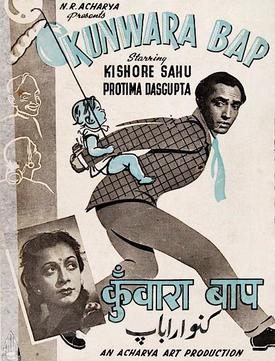
Kunwara Baap is a 1942 Hindi comedy film directed by Kishore Sahu. The film was the debut directorial venture for Sahu, who directed it for the debutant producer N. R. Acharya. Acharya had just started his production company Acharya Arts Productions. The story was written by Kishore Sahu who went on to write and direct films like Kali Ghata, Mayurpankh and others. The music direction was by Ramchandra Pal. The film had Kishore Sahu starring as the bachelor father with co-stars Protima Dasgupta, Anjali Devi, Nana Palsikar, Amritlal Nagar and Moni Chatterjee.
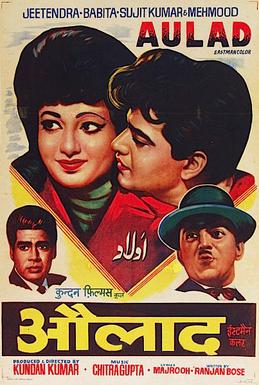
Aulad is a 1968 Hindi-language drama film, produced and directed by Kundan Kumar under the Kundan Films banner. It stars Jeetendra, Babita with music composed by Chitragupta Shrivastav.

Hum Panchhi Ek Dal Ke is a 1957 Indian Hindi-language film starring Romi, Satish Vyas, Mohan Choti, Daisy Irani and Jagdeep in lead roles. It won the National Film Award for Best Children's Film.
Phiriye Dao is a Bengali language action drama film directed by Chiranjeet Chakraborty. This film was released in 1994 in the banner of Tirupati films. Music of the film was composed by Bappi Lahiri.
Moyla Kagaj is a Bengali social drama film directed by Premendra Mitra. This film was released in 1954 under the banner of Mitrani Limited.
